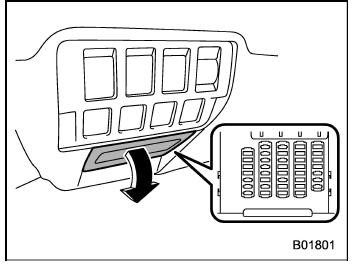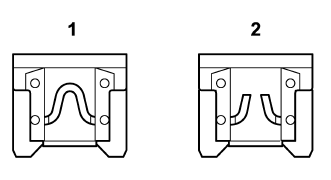Fuses and Relays
CAUTION
Never replace a fuse with one having a higher rating or with material other than a fuse because serious damage or a fire could result.
NOTE
Fuse rating and using circuit are described on each behind the fuse box cover.
Fuse rating and using circuit are described on each behind the fuse box cover.
The fuses are designed to melt during an overload to prevent damage to the wiring harness and electrical equipment. The fuses are located in two fuse boxes.
 |
| Instrument Fuse Panel |
One is located under the instrument panel behind the fuse box cover on the driver’s seat side. To remove the cover, pull it out.
 |
| Spare Fuses Location |
The other one (main fuse box) is housed in the engine compartment. Also, the spare fuses are stored in the fuse box cover.
The fuse puller is stored in the main fuse box in the engine compartment.
Pinch the upper part of the fuse puller when removing it from the main fuse box.
 |
| 1) Good Fuse - 2) Blown Fuse |
If any lights, accessories or other electrical controls do not operate, inspect the corresponding fuse. If a fuse has blown, replace it.
1. Turn the ignition switch to the “LOCK”/ “OFF” position and turn off all electrical accessories.
2. Remove the cover.
3. Determine which fuse may be blown.
4. Pull out the fuse with the fuse puller.
5. Inspect the fuse. If it has blown, replace it with a spare fuse of the same rating.
6. If the same fuse blows again, this indicates that its system has a problem. Contact your SUBARU dealer for repairs.
5. Inspect the fuse. If it has blown, replace it with a spare fuse of the same rating.
6. If the same fuse blows again, this indicates that its system has a problem. Contact your SUBARU dealer for repairs.




No comments:
Post a Comment